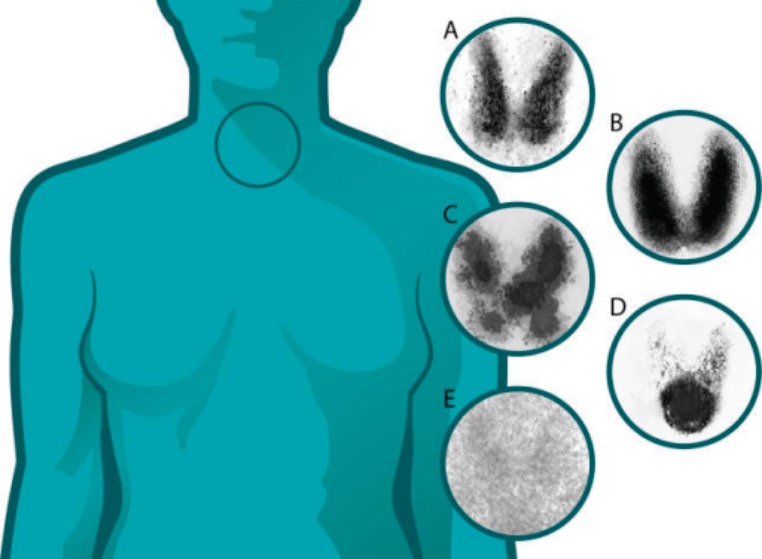Playlist
Show Playlist
Hide Playlist
Hashimoto's Thyroiditis and Subclinical Hypothyroidism
-
Slides Thyroid Disease.pdf
-
Download Lecture Overview
00:01 Hashimoto's thyroiditis is the most frequent cause of pimary hypothyroidism in the United States. 00:07 It's also known as chronic lymphocytic thyroiditis. 00:10 a positive TPO antibody test will be present and initially they may actually have symptoms of hyperthryoidism, subsequently progressing to significant hypothyroidism. 00:23 The management of this condition, in patients with TSH greater than 10 microunits per mL, daily levothyroxine replacement is taken on an empty stomach to aid absorption in the jejunum. 00:35 The dose is titrated base on thyroid stimulating hormone levels measured 6-8 weeks after any dose adjustments Thyroid hormone deficiency usually implies low circulating thyroid hormone levels. 00:48 It's more prevalent in women than men with 2% versus 0.2% and those with other automimmune disorders. 00:57 The top ten causes of thyroid hormone deficiency is as follows: Hashimoto's thyroiditis is by far the most common in the US, followed by iodine deficiency which is the most common cause worldwide Thyroid surgery with subsequent thyroid hormone deficiency is another cause, radioactive iodine therapy, external beam radiation to the neck for malignancies Medications like lithium and amiodarone, as well as interferon, and tyrosine kinase inhibitors can inhibit thyroid hormone production. 01:30 Pituitary tunors, severe head trauma and pituitary surgery are rarer causes And then finally, cranial irradiation which may cause central hyperthyroidism. 01:42 The signs and symptoms of hypothyroidism are numerous. 01:45 Starting with the symptoms, patients usually complain of being fatigued, being intolerant to the cold, having constipation. 01:53 In women they may complain of heavy menses, they may complain of weight gain, they may also have impaired concentration. 02:01 They note very dry skin and puffiness which is related to the presence of edema Also they can have mood changes, depression. 02:10 They may complain of muscle cramps, myalgias and reduced fertility. 02:16 On physical exam, patients with hypothyroidism have fairly classic features. 02:20 There may be reduction in basal body temperature. 02:23 They may also note diastolic hypertension or high diastolic blood pressure. 02:28 They may be bradycardic when the heart rate is low. 02:31 On examination of the skin and the hair, the hair be dry and brittle - the hair may also fall out easily. 02:37 they may complain of baldness, and patients can also be hoarse One of the classic features on neurologic exam is delayed relaxation phase of the deep tendon reflexes. 02:50 and this is pretty classic for hypothyroidism. 02:52 On standardized testing like USMLE-CK, this would usually be given in the stem of the question where they want you to think of hypothyroidism as a possible cause. 03:02 And then finally, enlargement of the thyroid gland or goiter is a common accompaniment to hypothyroidism. 03:10 Subclinical hypothyroidism is another interesting entity. 03:13 This usually manifest with an elevated TSH level with a normal T4 level in asymptomatic patients. 03:21 The TSH levels normalizes in up to 30% of the patient by 6 weeks on its own. 03:26 Elevated total cholesterol, LDL cholesterol and C-reactive protein levels may also occur. 03:33 The treatment for this condition is only recommended when the TSH level is greater than 10 microunits per mL as this may be a risk factor for coronary artery disease and congestive heart failure. 03:46 A goal TSH level of less than or equal to 2.5 microunits per mL is recommended for women with subclinical hypothyroidism and a positive TPO antibody who are planning to get pregnant.
About the Lecture
The lecture Hashimoto's Thyroiditis and Subclinical Hypothyroidism by Michael Lazarus, MD is from the course Thyroid Disorders.
Included Quiz Questions
What is the most common cause of hypothyroidism in the United States?
- Hashimoto's thyroiditis
- Amiodarone toxicity
- Iodine deficiency
- External beam radiation to the neck
- Head trauma
What of the following factors would make you most likely to start a patient with subclinical hypothyroidism on thyroid replacement therapy?
- TSH > 10
- TSH ≤ 2.5
- Weight gain > 5 lb
- Myalgia
- Bradycardia
Customer reviews
5,0 of 5 stars
| 5 Stars |
|
1 |
| 4 Stars |
|
0 |
| 3 Stars |
|
0 |
| 2 Stars |
|
0 |
| 1 Star |
|
0 |
me gusto la explicacion y la sintesis que le dio del Dr. Michael. Ademas da buenos puntos y recomendaciones para la practica clinica.




